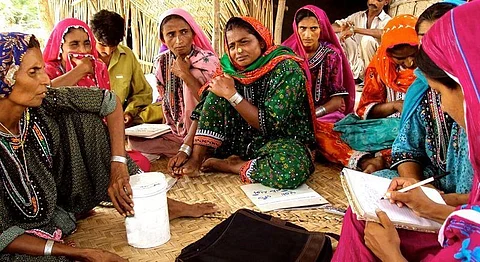
- HOMEGROWN WORLD
- #HGCREATORS
- #HGEXPLORE
- #HGVOICES
- #HGSHOP
- CAREERS
- ABOUT US
- CONTACT US

“I wish I had learned about birth control 15 years ago,” says Azima Khaskheli, a 45-year-old livestock breeder in the village of Allah Bachayo Khaskheli in Pakistan. If not sooner, Azima and some other families in the her village have gotten an opportunity to the learn the lessons that would have been incomprehensible to them if it wasn’t for the women of Marvi (Marginalised Area Reproductive Health Viable Initiative).
Knocking from door to door to educate families about reproductive health and family planning, the women of Marvi are semi-literate women between the age of eighteen to forty five from the villages of rural Pakistan. Their job starts as early as 8 in the morning and goes until late evenings, where the hand condoms, birth control pills and intrauterine devices to women and men. Going out of their way; as of now, there are about 1,600 Marvis who are trained by Karachi-based Health and Nutrition Development Society that pulls out these women from such shelter corners and pushes them back in as trained volunteers.
These workers receive a six-day training by the organisation, where they learn about the pros and cons of using contraceptives, how to handle the objections against the use of birth control, and last but not the least how to cover an area filled with approximate 1,000 inhabitants.
Now a volunteer, Samina who initially opposed the usage contraceptives, explains that women like her are conditioned to think that birth control of any kind is sinful. But at the same time, she grew to realise the importance of reproductive health and how birth control could make the ends meet. “In our village, there was no information about family planning. Many women died during childbirth,” says Samina about what inspired her to join.
As per report, Samina’s facts are not wrong. Pakistan is reported to have Asia’s highest maternal mortality rate because out of the population of more than 190 million, only 35 per cent of women use contraception. Moreover, since the rural areas are more undeserved and sheltered than the cities, women in the rural areas give birth to an average of 4.2 children, which is more compared in the cities. This leads to the deprivation of literacy in sexual health and of economic opportunities as well.
However, initiatives like MARVI are slowly changing the atmosphere in these villages by removing stigmas and improving economic conditions. With at least 1,000 trained volunteers, the women of Marvi have extended their support to helping women suffering with different kinds of illnesses and infants who need support from beyond their mothers. Over and above, they are slowly sweeping away the taboos ingrained in Islamic cultures against the use of contraceptives. Now slowly constructing a culture that is accepting than just tolerant, a women like Samina has been able to teach the lessons from the Quran and about birth control in the same household.
If you enjoyed reading this article we suggest you read:
